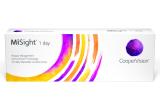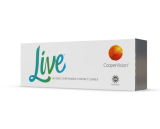What foods are good for our eyesight? Many of us try to eat the right foods to slim down and get into shape, but our vision is important too. Does a carrot a day keep the optometrist away?
Let’s separate fact from fiction and get the straight info on vitamins for the eyes.
Carrots and nutrition for the eyes
You’ve likely heard that eating carrots helps improve our vision. But is this just a myth told by parents everywhere to get their kids to gobble down more vegetables? Not quite. As it turns out, Mom and Dad are right...mostly.
Vitamin A and vision make potent allies. Carrots contain lots of beta carotene and Vitamin A, which can contribute to your eyes’ health and may provide a fantastic source of eye vitamins for macular degeneration and cataracts.
Good sources of Vitamin A and rhodopsin are also abundant in carrots. Rhodopsin is a purple pigment that helps us see in low light situations. Without enough rhodopsin, we wouldn’t be able to see very well at night, even with a cloudless sky and bright full moon.
So this begs the question: Could eating carrots morning, noon and night give you extraordinary powers to see like an owl on the blackest nights? Umm, no. While carrots offer many beneficial vitamins for your eyes, they will not turn you into a superhero. (But they can turn your skin slightly orange, if you eat too many!)
In an interesting turn, the myth of carrots and vision stems from World War II. Most food was in short supply then—but not carrots. The British Royal Air Force credited eating carrots with an increased ability to see the enemy in the dark. This rumour was set in motion to motivate more people to eat carrots. Today, this vision-related scuttlebutt still exists and, as we’ve seen, there is some truth—along with some exaggeration—to it.
Now that you know more about carrots and our eyes, you might be wondering about other vitamins for your vision.
Other important vision vitamins for good eyesight
If you’re like most people, you’re wondering, “Do vitamins for vision work?” The simple answer is, as we’ve seen with Vitamin A in carrots, yes…but in varying degrees. There are vitamins for vision loss that you can take, but none of them produce miraculous results.
Getting enough vitamins is important at every age, especially natural vitamins in your food. The functions of vitamins can be numerous. Their benefits are evident. To help you, we’ve decided to list other vitamins, their benefits to your eyes, and what foods provide them abundantly.
Vitamin C for eyes
Vitamin C is a health powerhouse. You can find it in fruits like oranges, kiwi, and strawberries, as well as vegetables like broccoli, mustard greens, and peppers. In addition to providing antioxidants, it can also help slow cataracts and provide needed eye vitamins for macular degeneration.
Vitamin E for eye health
Depending on which study you read, Vitamin E may serve as a great antioxidant and agent against cataracts and macular degeneration as well. You can find Vitamin E in many nuts, like almonds, peanuts, and pine nuts, along with dried apricots and sunflower seeds.
Lutein for aging eyes
Lutein is a nutrient found in kale, spinach, and turnip greens. It’s also found in our retinas, so it’s an important part of healthy vision. Eating carotenoids like lutein and zeaxanthin (yes, that’s a mouthful!) provide you with great antioxidants and may help against age-related vision problems such as cataracts and macular degeneration.
As we’ve seen, eating the right vitamins for eyesight can provide an excellent defence against vision problems that often arrive later in life. No matter what age you may be, strive to be proactive in your health. As many experts say, “Eat your colours!” Fresh vegetables and fruit can naturally provide many of the vitamins needed for healthy vision—and make tasty sides and garnishes, too!






